Below I have 3 methods. The first is very simple. It just counts the total number of days. The second, however, will not only count the days, but will ignore the days of the week that are passed in to the method.
My problem is that the third method is not always correct. It should match the second method. I am guessing it has something to do with leap years, because the difference is usually +=3|4 when it is incorrect.
Additional Info
I am attempting to mock Excel's weekday(serial_number,[return_type]) formula in a way.
serial_number = startDate:Date - daysOfWeekToInclude:Array<Integer>
Example
| A | B | C
+---------+----------------------------------------------------+-----------
1 | Start | =DATE(2014,9,7) | 9/7/2014
2 | End | =DATE(2025,6,13) | 6/13/2025
3 | Include | ={1,2,4,6} (Mon, Tue, Thu, & Sat) | <Disp Only>
4 | Days | =SUM(INT((WEEKDAY($B$1-{1,2,4,6},1)+$B$2-$B$1)/7)) | 2248
There is more information on this function here: How to count / calculate the number of days between two dates in Excel?
Raw Image

Methods
Simply count the number of days between two dates.
public static int simpleDaysBetween(final LocalDate start, final LocalDate end) { return (int) ChronoUnit.DAYS.between(start, end); }Count number of days, ignoring certain days of week, using a loop.
public static int betterDaysBetween(final LocalDate start, final LocalDate end, final List<DayOfWeek> ignore) { int count = 0; LocalDate curr = start.plusDays(0); while (curr.isBefore(end)) { if (!ignore.contains(curr.getDayOfWeek())) { count++; } curr = curr.plusDays(1); // Increment by a day. } return count; }Count number of days. again but without a loop.
public static int bestDaysBetween(final LocalDate start, final LocalDate end, final List<DayOfWeek> ignore) { int days = simpleDaysBetween(start, end); if (days == 0) { return 0; } if (!ignore.isEmpty()) { int weeks = days / 7; int startDay = start.getDayOfWeek().getValue(); int endDay = end.getDayOfWeek().getValue(); int diff = weeks * ignore.size(); for (DayOfWeek day : ignore) { int currDay = day.getValue(); if (startDay <= currDay) { diff++; } if (endDay > currDay) { diff++; } } if (endDay > startDay) { diff -= endDay - startDay; } return days - diff; } return days; }
Full code
import java.time.DayOfWeek;
import java.time.LocalDate;
import java.time.temporal.ChronoUnit;
import java.util.Arrays;
import java.util.List;
public class DayCounter {
public static void main(String[] args) {
final LocalDate start = LocalDate.of(2014, 9, 7);
final LocalDate end = LocalDate.of(2025, 6, 13);
List<DayOfWeek> ignore = Arrays.asList(DayOfWeek.SUNDAY, DayOfWeek.WEDNESDAY, DayOfWeek.FRIDAY);
print(start);
print(end);
System.out.println(simpleDaysBetween(start, end));
System.out.println(betterDaysBetween(start, end, ignore));
System.out.println(bestDaysBetween(start, end, ignore));
}
public static void print(LocalDate date) {
System.out.printf("%s -> %s%n", date, date.getDayOfWeek());
}
public static int simpleDaysBetween(final LocalDate start,
final LocalDate end) {
return (int) ChronoUnit.DAYS.between(start, end);
}
public static int betterDaysBetween(final LocalDate start,
final LocalDate end, final List<DayOfWeek> ignore) {
int count = 0;
LocalDate curr = start.plusDays(0);
while (curr.isBefore(end)) {
if (!ignore.contains(curr.getDayOfWeek())) {
count++;
}
curr = curr.plusDays(1); // Increment by a day.
}
return count;
}
public static int bestDaysBetween(final LocalDate start,
final LocalDate end, final List<DayOfWeek> ignore) {
int days = simpleDaysBetween(start, end);
if (days == 0) {
return 0;
}
if (!ignore.isEmpty()) {
int weeks = days / 7;
int startDay = start.getDayOfWeek().getValue();
int endDay = end.getDayOfWeek().getValue();
int diff = weeks * ignore.size();
for (DayOfWeek day : ignore) {
int currDay = day.getValue();
if (startDay <= currDay) {
diff++;
}
if (endDay > currDay) {
diff++;
}
}
if (endDay > startDay) {
diff -= endDay - startDay;
}
return days - diff;
}
return days;
}
}
